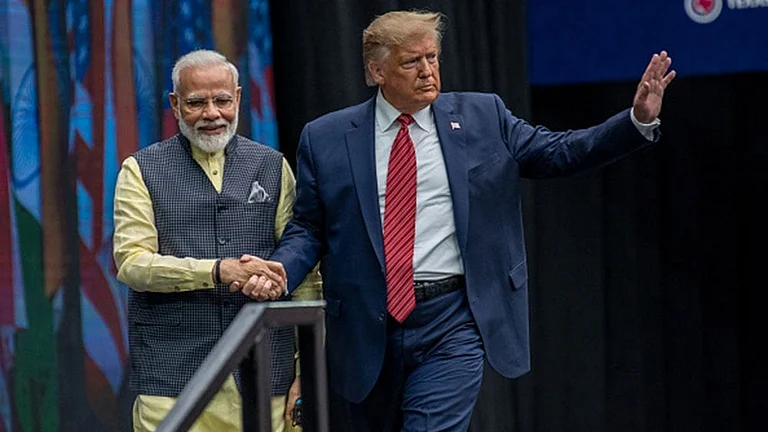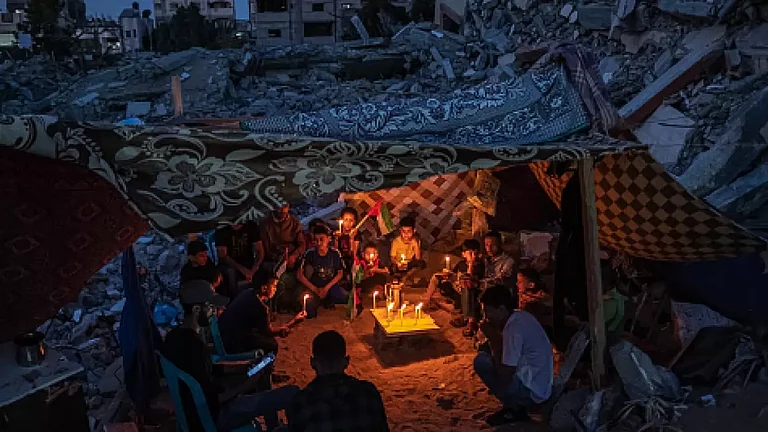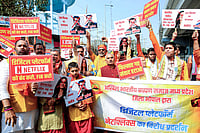As official figures clock at least 35,173 deaths in Gaza, Palestinians around the world mark the Nakba, on May 15, meaning 'catastrophe' in Arabic, referring to the ethnic cleansing of Palestine in 1948. This is also the day when the Jewish state of Israel came into existence as the British Mandate, a League of Nations mandate designed for British control over Palestine and Transjordan expired, and Zionist stakeholders declared the establishment, triggering the first Arab-Israeli war. Formally, the day was inaugurated by Palestinian leader Yasser Arafat in 1998, but has been recognised as the day of beginning of Israel’s assault on the holy land since 1949.
The Nakba signifies the forced expulsion of at least 750,000 Palestinians from the land by Zionist forces. By 1949, almost 15,000 Palestinians were killed in mass atrocities, bombings, lootings and sponsored massacres. The newly formed Israel was carved out of 78 percent of historic Palestine, while the remaining 22 percent was divided into what are now the occupied West Bank and the Gaza Strip.
A recently issued statement by the Iranian Foreign Ministry reads, “May 14, 1948 was the beginning of the miserable era of the occupation of the Palestinian lands and the flagrant violation of the rights of its oppressed people, especially their right to self-determination whose sinister repercussions have affected the region and the Muslim world for 76 years and has turned into a deep and painful sore on the body of the Islamic world”.
For Palestinians across the globe, Nakba Day marks the beginning of the bloody genocide, large-scale displacement, occupation of the holy land, and Israel refusing them the right to return to their land. For many, Israel’s war on Gaza over the past seven months is another genocidal chapter, as Gaza continues to grapple with mounting bloodshed and death every passing day.
Situation in Gaza
The United Nations’ agency for Palestinian refugees said 360,000 Palestinians have fled Rafah over the past week, out of 1.3 million who were sheltering there before the operation began. With Israel intensifying attacks on Rafah and sealing the borders preventing the flow of aid into Gaza, Gaza’s health ministry has said the health system across the enclave could collapse in a “few hours”. “A few hours separate us from the collapse of the health system in the Gaza Strip as a result of the failure to bring in the fuel necessary to operate electricity generators in hospitals, ambulances, and transport employees,” the ministry was quoted by Al Jazeera as saying in a post on social media.
Israel’s heavy offensive on Rafah came with the initial disagreements over terms of a ceasefire and the Hamas attack on Kerem Shalom. According to senior officials, the military offensive would not stop before the total elimination of Hamas in Gaza or the release of hostages held by them.
Although, reiterating that a major military operation by Israel in Rafah would be a mistake, US National Security Adviser Jake Sullivan said, “We do not believe what is happening in Gaza is a genocide. We have been firmly on record rejecting that proposition.” These statements come in the aftermath of the Rafah offensive, which saw the US blocking a shipment of heavy ammunition to Israel. The US State Department spokesperson Matthew Miller had earlier confirmed that Israel’s attack on the Palestinian side of Rafah happened without Washington’s approval. “I’m not supplying the weapons that have been used historically to deal with Rafah, to deal with the cities, that deal with that problem,” President Joe Biden had assured, if the IDF decided to move into civilian territories of Gaza.
According to Al Jazeera, Doctors Without Borders (MSF) has had to stop operations owing to a complete collapse of medical amenities. They had earlier issued a warning following the halt of flow of essential aid into the Palestinian side of Rafah from Egypt, signalling an absolute threat to humanitarian response to the crisis. They had further warned that water, food and medicine in Gaza are reaching “dangerously low” levels and urged for civilian protection in Rafah.
A proposed ceasefire including representatives of both parties was in the works over the last few weeks, but according to recent developments, Israel’s military operation in Rafah has affected ceasefire negotiations with Hamas, leading to talks not taking shape, as confirmed by mediator Qatar. “Especially in the past few weeks, we have seen some momentum building but unfortunately things didn’t move in the right direction and right now we are on a status of almost a stalemate,” Prime Minister Sheikh Mohammed bin Abdulrahman bin Jassim Al Thani told the Qatar Economic Forum in Doha on Tuesday, as quoted by Al Jazeera.
Israeli forces continued to drill into eastern Rafah, entering the neighbourhoods of al-Jnaina, as-Salam following the army continuing to issue evacuation orders displacing countless people. Israeli forces were also continuing to operate with extreme force in Jabalia city, Jabalia refugee camp and surrounding areas in northern Gaza.
Recently, in a historic move, all 193 countries in the United Nations Assembly had an urgent meeting about a special resolution called 'Admission of new Members to the United Nations,' which was presented by the United Arab Emirates, to vote for Palestine becoming a full member of the UN. The resolution received support from 143 countries, while nine countries voted against it, and 25 abstained.
The UN’s International Court of Justice (ICJ) will hold hearings on Thursday and Friday to discuss new emergency measures sought by South Africa over Israel’s attacks on Rafah during the war in Gaza. The hearing comes in request of immediate effects as attacks on Gaza continue to intensify. The is part of the ongoing case by South Africa against Israel which was initiated in January, accusing the country of launching a full-scale genocide against Gaza. Egypt has joined Turkey and Colombia in formally requesting to join the case against Israel.






























